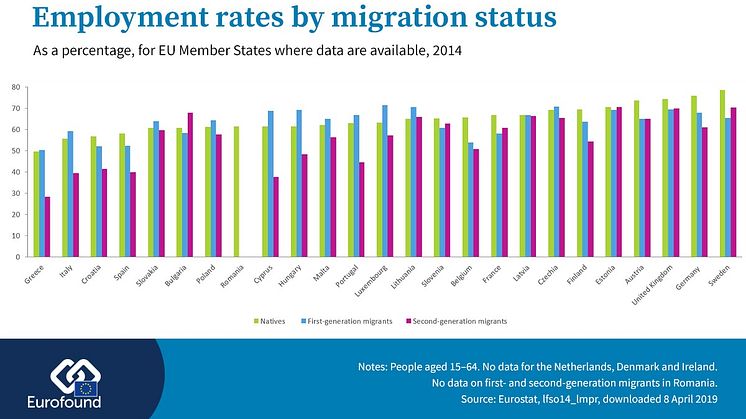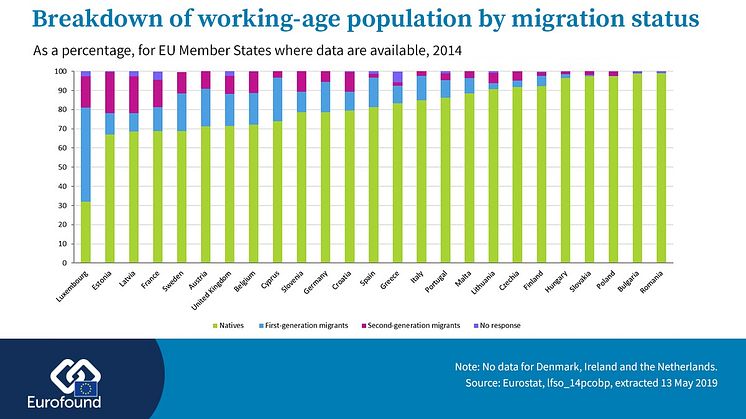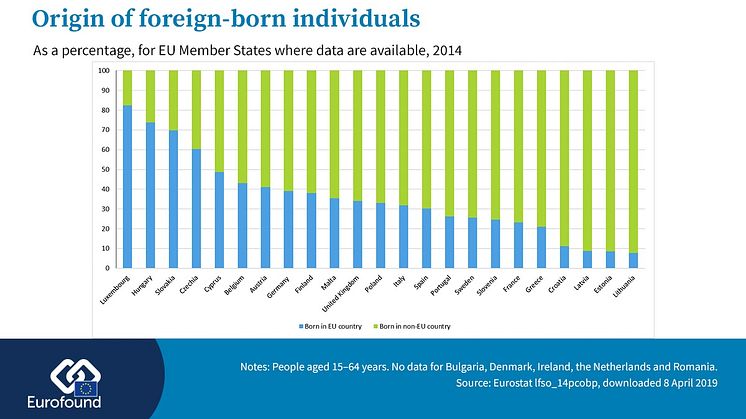
News -
Second-generation EU migrants outperform natives on the labour market
Second-generation migrants with an EU background are more likely to be employed and in high-performing positions, such as managerial roles, than first-generation migrants – and even outperform natives in terms of employment rate. Having a European background plays a significant role: 81% of second-generation migrants with at least one parent born in the EU are in employment, compared to 74% of second-generation migrants with a non-EU background. Overall, first generation migrants are more likely to be in employment than natives in several Member States, as most move in search of work. Again, European background makes a difference as just two-thirds of first-generation migrants with a non-EU background are in employment, 13% below the native population.
Eurofound’s policy brief ‘How your birthplace affects your workplace’ uses national and EU-level data, including the European Working Conditions Survey, to analyse the employment and labour market progression of workers with a migrant background, compared to workers with no migrant background. It finds that having a foreign background – as is the case for one-fifth of the working-age population in the EU – has a profound overall impact on employment prospects, progression and working conditions.
Overall, Eurofound’s analysis shows that workers with a foreign background are more likely to face difficult working conditions and less secure contractual arrangements. For example, they are more likely to have a precarious contract, with first-generation migrants making up 14% of fixed-term contract workers, compared to 10% for those with no migrant background. Workers with a foreign background are also more likely to work 20 hours or less in their main job. Both first-generation and second-generation migrants are more likely to work a second job to top-up their income than workers with no migrant background.
Although there is evidence of strong labour market progression between first- and second-generation migrants, it seems that disadvantage due to background is more widespread for female workers. Not only are employment rates generally higher among male than female migrants, in 6 out of the 23 EU countries where data are available, female second-generation migrants have the lowest employment rates among the categories analysed.
This new research builds upon a previous analysis from Eurofound in 2018, stressing that region of origin, timing of migration, reason for migration and socioeconomic context play a significant role in determining labour market outcomes. In fact, region of origin is one of the greatest determinants of labour market progression and can remain so for generations. Workers of North African origin, and female workers of Asian origin, were found to be most disadvantaged, and were more likely to suffer this disadvantage into the second generation and beyond.
Eurofound’s research highlights the clear need for a nuanced approach to policymaking, that recognises the differences between first- and second-generation migrant workers – with a specific emphasis on the effective integration of women with a foreign background into the labour force.
More information:
- Download the policy brief: How your birthplace affects your workplace
- Relevant graphs and data from the research in the related content below




